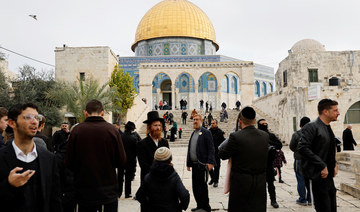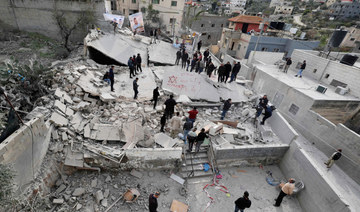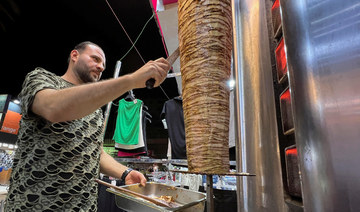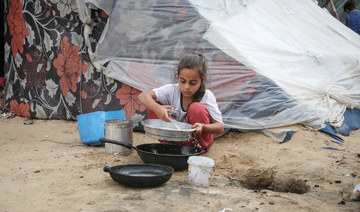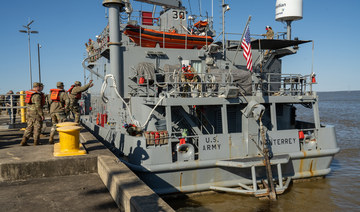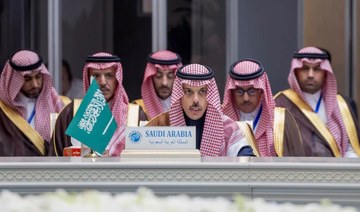JERUSALEM: When Israel struck an agreement with the United Arab Emirates to open diplomatic ties in 2020, it brought an electrifying sense of achievement to a country long ostracized in the Middle East.
Officials insisted that Israel’s new ties with the UAE, and soon after with Bahrain, would go beyond governments and become society-wide pacts, stoking mass tourism and friendly exchanges between people long at odds.
But over two years since the breakthrough accords, the expected flood of Gulf Arab tourists to Israel has been little more than a trickle. Although more than half a million Israelis have flocked to oil-rich Abu Dhabi and skyscraper-studded Dubai, just 1,600 Emirati citizens have visited Israel since it lifted coronavirus travel restrictions last year, the Israeli Tourism Ministry told The Associated Press.
The ministry does not know how many Bahrainis have visited Israel because, it said, “the numbers are too small.”
“It’s still a very weird and sensitive situation,” said Mursi Hija, head of the forum for Arabic-speaking tour guides in Israel. “The Emiratis feel like they’ve done something wrong in coming here.”
The lack of Emirati and Bahraini tourists reflects Israel’s long-standing image problem in the Arab world and reveals the limits of the Abraham Accords, experts say.
Even as bilateral trade between Israel and the UAE has exploded from $11.2 million in 2019 to $1.2 billion last year, the popularity of the agreements in the UAE and Bahrain has plummeted since the deals were signed, according to a survey by the Washington Institute for Near East Policy, an American think tank.
In the UAE, support fell to 25 percent from 47 percent in the last two years. In Bahrain, just 20 percent of the population supports the deal, down from 45 percent in 2020. In that time, Israel and Gaza militants fought a devastating war and violence in the occupied West Bank surged to its highest levels in years.
Israeli officials say Gulf Arab tourism to Israel is a missing piece that would move the agreements beyond security and diplomatic ties. Tourist visits from Egypt and Jordan, the first two countries to reach peace with Israel, also are virtually nonexistent.
“We need to encourage (Emiratis) to come for the first time. It’s an important mission,” Amir Hayek, Israeli ambassador to the UAE, told the AP. “We need to promote tourism so people will know each other and understand each other.”
Israeli tourism officials flew to the UAE last month in a marketing push to spread the word that Israel is a safe and attractive destination. The ministry said it’s now pitching Tel Aviv — Israel’s commercial and entertainment hub — as a big draw for Emiratis.
Tour agents say that so far, betting on Jerusalem has backfired. The turmoil of the contested city has turned off Emiratis and Bahrainis, some of whom have faced backlash from Palestinians who see normalization as a betrayal of their cause. The Palestinian struggle for independence from Israel enjoys broad support across the Arab world.
“There’s still a lot of hesitation coming from the Arab world,” said Dan Feferman, director of Sharaka, a group that promotes people-to-people exchanges between Israel and the Arab world. “They expect (Israel) to be a conflict zone, they expect to be discriminated against.” After leading two trips of Bahrainis and Emiratis to Israel, Sharaka struggled to find more Gulf Arab citizens interested in visiting, he said.
When a group of Emirati and Bahraini social media influencers in 2020 visited the Al Aqsa Mosque compound, the third-holiest site in Islam, they were spat on and pelted with shoes in Jerusalem’s Old City, said Hija, their tour guide.
When another group of Emirati officials visited the flashpoint site accompanied by Israeli police, they drew the ire of the grand mufti of Jerusalem, Sheikh Muhammad Ahmad Hussein, who issued a religious edict against Emiratis visiting the mosque under Israeli supervision.
Most Emiratis and Bahrainis who have visited Israel say they forgo their national dress and headscarves in order not to attract attention.
The Islamic Waqf, which administers the mosque, declined to answer questions about the number of Emirati and Bahraini visitors and their treatment at the compound.
Palestinian rage against Emiratis is not confined to the sacred esplanade. Emirati citizens visiting and studying in Israel say they face frequent death threats and online attacks.
“Not everyone can handle the pressure,” said Sumaiiah Almehiri, a 31-year-old Emirati from Dubai studying to be a nurse at the University of Haifa. “I didn’t give into the threats, but fear is preventing a lot of Emiratis from going.”
The fear of anti-Arab racism in Israel can also drive Gulf Arabs away. Israeli police mistakenly arrested two Emirati tourists in Tel Aviv last summer while hunting for a criminal who carried out a drive-by shooting. Some Emiratis have complained on social media about drawing unwanted scrutiny from security officials at Israel’s Ben-Gurion Airport.
“If you bring them here and don’t treat them in a sensitive way, they’ll never come back and tell all their friends to stay away,” Hija said.
Benjamin Netanyahu, who returned for a sixth term as prime minister last week, has pledged to strengthen agreements with Bahrain, Morocco, the UAE and Sudan. Formal ties with Sudan remain elusive in the wake of a military coup and in the absence of a parliament to ratify its US-brokered normalization deal with Israel.
As a chief architect of the accords, Netanyahu also hopes to expand the circle of countries and reach a similar deal with Saudi Arabia.
Yet experts fear his new government — the most ultranationalist and religiously conservative in Israel’s history — could further deter Gulf Arab tourists and even jeopardize the agreements. His government has vowed to expand West Bank settlements and pledged to annex the entire territory, a step that was put on hold as a condition of the initial agreement with the UAE.
“We have a reason to be worried about any deterioration in relations,” said Moran Zaga, an expert in Gulf Arab states at the University of Haifa in Israel.
So far, Gulf Arab governments have offered no reason for concern.
The Emirati ambassador was photographed warmly embracing Itamar Ben-Gvir, one of the coalition’s most radical members, at a national day celebration last month. And over the weekend, the UAE’s leader, Sheikh Mohammed bin Zayed Al Nahyan, called Netanyahu to congratulate him and invite him to visit.
It’s a different story among those who are not in the officialdom.
“I hope that Netanyahu and those with him will not set foot on the land of the Emirates,” Abdulkhaleq Abdulla, a prominent Emirati political scientist, wrote on Twitter. “I think it is appropriate to freeze the Abraham Accords temporarily.”
Where are the Gulf Arab tourists? Israel’s hopes fall short
https://arab.news/r2phc
Where are the Gulf Arab tourists? Israel’s hopes fall short
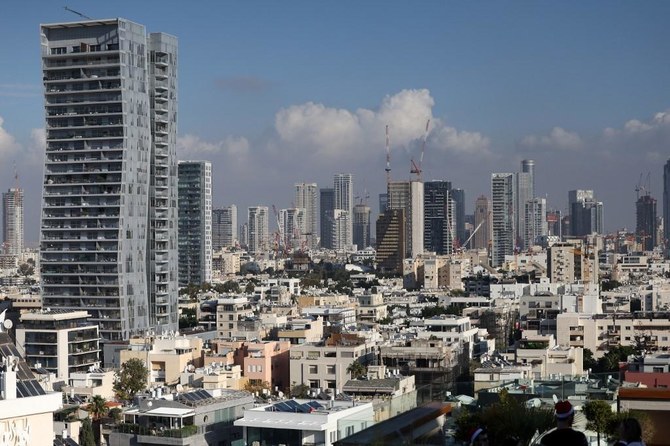
- Over two years since the breakthrough accords, the expected flood of Gulf Arab tourists to Israel has been little more than a trickle
Puppet maker turns tins into toys in ruins of war
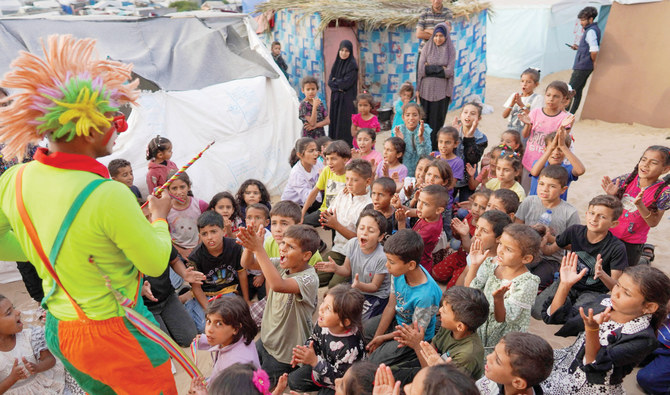
DEIR AL-BALAH: On a cinder block work table in the war-torn Gaza Strip, puppet maker Mahdi Karira is busy turning old tin cans into figurines.
He hums as he works, knowing his makeshift marionettes will put a smile on the faces of children displaced by the more than six-month war in the coastal Palestinian territory.
“These puppets can make things around us beautiful,” he said, surveying his handiwork.
Before the war, Karira had a large collection of brightly colored puppets, often taking them to perform in theaters.
Now, he performs in camps for displaced people after Israeli bombardment forced him to flee his home in Gaza City to Deir Al-Balah, in the center of the narrow strip.
Several puppets are suspended along the workshop walls.
Their bodies are topped by expressive human faces carved onto wood or tin cans, and their limbs are hooked to strings that Karira uses to make them walk and talk.
With Gaza under siege, new materials are hard to come by, so he makes do with debris, fishing lines, and old sardine tins stamped with the UN logo, which he brings to life with a touch of paint.
“Unfortunately, after the displacement, there were no more puppets, no more theater,” he said.
“I left all my work in Gaza City,” in the territory’s north.
“There are not many raw materials to work with — only cans of all shapes and sizes around us.”
UNICEF, the UN children’s agency, estimates the war in Gaza has displaced around 850,000 children in Gaza.
Many are sheltering in camps around Deir Al-Balah, where childhood fun is a distant memory.
“I try to make shows and performances to bring joy to the children in the displacement camps, so we remain steadfast on this earth despite the aggressions,” Karira said about Israel’s air and ground campaign in Gaza, sitting beside his pliers and a painted puppet head.
Karina said keeping up his craft as the war rumbled around him was vital.
“The most important thing is to remain faithful to your work by creating your art,” he said.
“Each of us has his trade, talents, and art that allows him to continue to have an activity despite the aggression.”
The territory’s cultural heritage has been devastated — from art centers and museums to historic buildings.
As he watches Gaza reduced to rubble, Karira said the puppets “can tell beautiful things, tell our history and stories to children.”
Gaza aid pier ready in two to three weeks: US
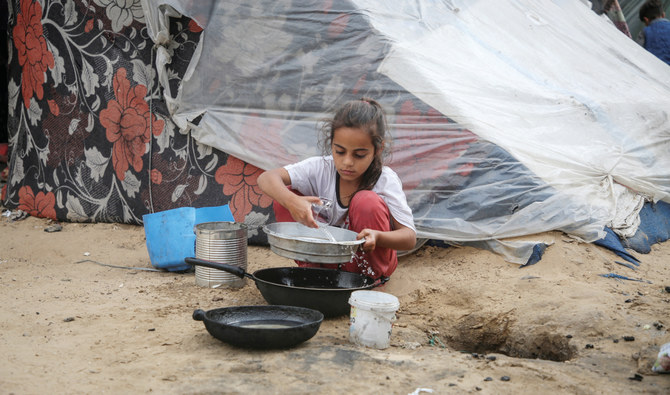
- Israel faces growing pressure to enable more aid deliveries as the UN warns famine is imminent
WASHINGTON: The White House said on Sunday that a US-made pier meant to boost aid to Gaza would become operational in a few weeks but cannot replace land routes with trucks as the best way to feed people in the territory.
Israel’s more than six-month war against Hamas in Gaza has triggered a humanitarian crisis, and it faces growing pressure to enable more aid deliveries as the UN warns famine is imminent.
The Pentagon said last week that the US military had begun building a pier to speed up aid deliveries.
“It will take probably two to three weeks before we can see an operation,” White House national security spokesman John Kirby said Sunday on ABC News.
Kirby said the floating platform to bring more food and other essentials to Gaza will help, but it has limits.
“Nothing can replace, quite frankly, the ground routes and the trucks that are getting in,” Kirby said.
After the killing of seven aid workers in an Israel strike on April 1, which drew international outrage, President Joe Biden bluntly told Israel to change the way it is waging the war.
He said it was imperative that Israel let in more aid and take more pains to avoid Palestinian civilian casualties.
Biden said continued US aid to Israel would depend on such changes being made.
Kirby said Israel is now, in fact, letting in more trucks, including in the particularly hard-hit north of Gaza.
“The Israelis have started to meet the commitments President Biden asked them to meet,” he said.
Plans for the pier were first announced by President Biden in early March, as Israel was being accused of holding up aid deliveries on land.
Kirby also said Israel had agreed to listen to US concerns and thoughts before it launched an invasion of the border city of Rafah in Gaza.
“They’ve assured us that they won’t go into Rafah until we’ve had a chance to really share our perspectives and concerns with them,” Kirby told ABC.
US Secretary of State Antony Blinken is due to visit the region next week and Kirby said he would continue pressing for a temporary ceasefire that Washington wants to last for at least six weeks.
A Hamas official said a delegation will visit Cairo on Monday for talks to secure a ceasefire.
Jordanian PM, Palestinian president meet in Riyadh
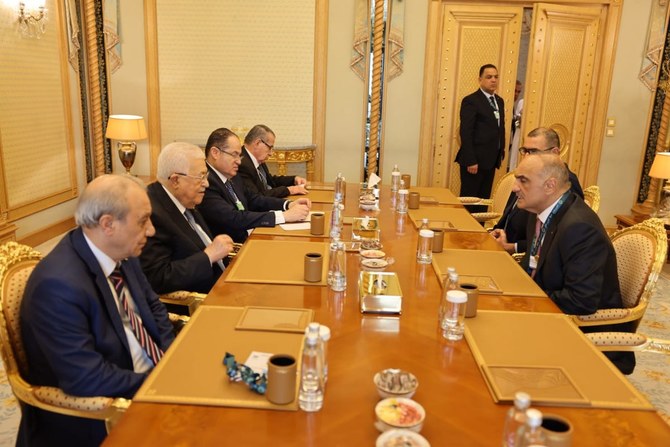
- Khasawneh underlined Jordan's efforts to halt the war in Gaza and ensure sustained humanitarian aid flow
RIYADH: Jordan’s Prime Minister Bisher Khasawneh met with Palestinian President Mahmoud Abbas during a special session of the World Economic Forum in Riyadh on Monday, Jordan News Agency reported.
Khasawneh reaffirmed Jordan’s support for the Palestinian cause and its commitment to providing assistance to Palestinians in their pursuit of legitimate rights on their national soil.
He said that lasting peace and stability in the region depend on a political resolution within the framework of a two-state solution.
Khasawneh said that such a solution should lead to the establishment of an independent, fully sovereign Palestinian state, with East Jerusalem as its capital, based on the lines of June 4, 1967.
He underlined Jordan's efforts to halt the war in Gaza and ensure sustained humanitarian aid flow.
Jordan remains committed to delivering aid to Gaza through both land crossings and airdrops conducted by the Jordanian army, Khasawneh said.
In a CNN interview earlier this month, Jordan’s Queen Rania explained the reason for the airdrops in an area where the UN has reported a widespread food crisis.
“We found that after trying so hard in vain to persuade Israel to open the land access points, that we had to do something. We couldn’t just sit idle and watch people starving,” she said.
Khasawneh also warned against any Israeli military assault on the Palestinian city of Rafah.
Both parties agreed to convene meetings of the Jordanian-Palestinian Joint Higher Committee in Amman in early June, led by the respective prime ministers.
GCC countries can play pivotal role in Africa’s economic development, African stakeholders say
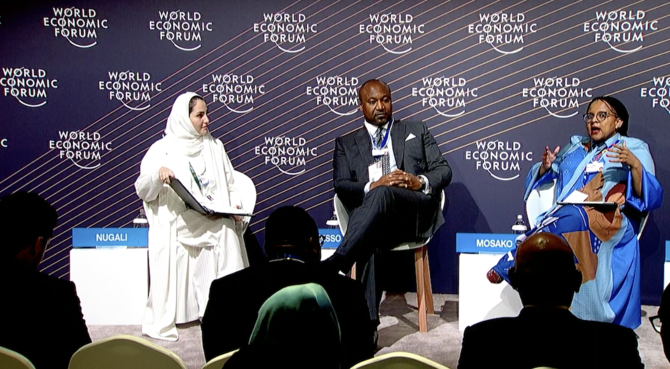
- Economic relations between Africa and the GCC are set to grow significantly in the coming years
RIYADH: Member nations of the Gulf Cooperation Council can play a pivotal role in developing African economies, a special meeting of the World Economic Forum in Riyadh was told on Sunday.
Economic relations between Africa and the GCC are set to grow significantly in the coming years, economists have said, driven by mutual interests in economic diversification, investment and sustainable development.
Denis Christel Sassou Nguesso, the Republic of Congo’s international cooperation minister, said countries in central and western Africa had traditionally looked to Western powers, such as the US, France and the UK, for assistance with their development but were increasingly looking to forge links with GCC countries.
“It’s a good opportunity and position to start to work on this cooperation with (countries such as) Saudi Arabia, UAE, Qatar, Oman and Bahrain. They can help (African) countries to develop their economies and infrastructure projects,” he said.
“We’re not looking for an equal economy (with GCC states), but we’d like to build some bridges toward partnerships between our countries, to promote the public-private partnership.”
Boitumelo Mosako, CEO at the Development Bank of Southern Africa, told the panel that the GCC and African Union were founded on the same date, which coincides with Africa Day.
The GCC and the Organization of African Unity, which was replaced by the African Union, were both founded on May 25.
This was a symbol of the strong partnerships that had evolved between Africa and GCC countries, especially in direct trade, Mosako said.
“When it comes to infrastructure, that is where I see the greatest opportunity. As we all know, (Africa) is a continent with an infrastructure backlog, but we are one with aspirations of implementing an African free-trade agreement.”
But in order for this to be achieved, infrastructure projects had to be built quickly, which would not only benefit African economies but also global partners as Africa’s exports to those countries would be able to increase exponentially, Mosako said.
Highlighting opportunities in energy investment from GCC countries, she added: “We have seen this in South Africa, where GCC companies have partnered local entities as part of a renewable energy program, so it’s not something far-fetched, it’s actually happening. It’s an opportunity to close the energy gap for the continent.”
Ousmane Dione, vice president for the Middle East and North Africa at the World Bank, said that at its shortest distance, there were only 26 km between Africa and the GCC, but there was a much bigger metaphorical gap in investment from the GCC states into Africa, which he called a “land of opportunity.”
He said that by 2035, there would be 430 million young Africans coming into the labor market competing for just 100 million jobs if current policies remained in place.
This could either be a “demographic liability or a demographic dividend” depending on how other countries viewed it, he said.
“I see the GCC countries really being a part of what will be the future of that relationship, in terms of a partnership.”
Houthis expecting ‘hostile’ reaction from US over Red Sea attacks, drone downing
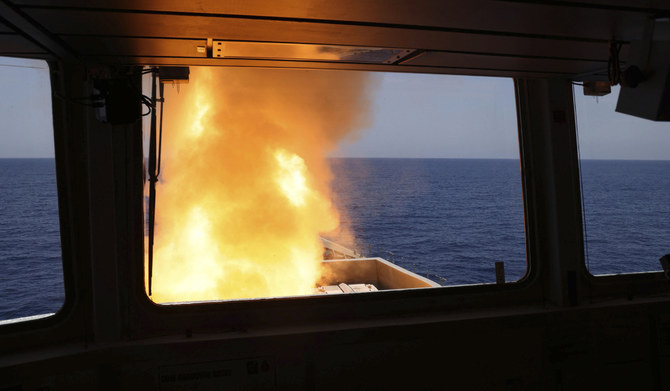
- US Defense Department says MQ-9 Reaper crashed in Yemen
- British-owned oil tanker damaged after being hit by missiles
AL-MUKALLA: The Houthis claim the US is planning a new round of strikes on Yemen in response to its attacks on ships in the Red Sea and the downing of an American drone.
In a post on X on Saturday afternoon, Hussein Al-Ezzi, the militia’s deputy foreign minister, said: “Now America and its mercenaries are considering new hostile plans, and we tell them the same thing: you will fail.”
In a separate message, posted on X on Saturday morning, Al-Ezzi said the Houthis were aware that the US was plotting a fresh military campaign against them and pledged to strike back against US interests wherever they may be.
That warning came after military spokesperson Yahya Sarea said the militia launched missiles at the British-owned and Panamanian-flagged Andromeda Star oil tanker in the Red Sea and shot down a US MQ-9 Reaper drone above its stronghold in the northern province of Saada.
US Defense Department spokesperson Lt. Col. Bryon J. McGarry told The Associated Press on Saturday that an MQ-9 drone had crashed in Yemen and that an inquiry was underway.
The US Central Command said on Saturday morning that the Andromeda Star received minor damage after being hit by missiles launched by the Houthis on Friday afternoon.
Shipping website Marinetraffic.com said the tanker was traveling from the Port of Sudan to an unnamed destination.
Houthi missiles on Friday also fell near the MV MAISHA, an oil tanker controlled by Liberia and traveling under the flag of Antigua and Barbuda, the Central Command said.
Since November, the Houthis have seized one commercial ship, sunk another and launched hundreds of missiles and drones at commercial and navy vessels in the Red Sea, Bab Al-Mandab Strait and the Gulf of Aden.
The group claims it targets vessels bound for or with links to Israel in a bid to force it to break its blockade on the Gaza Strip.
On Wednesday, the Houthis ended a nearly two-week break in their attacks by claiming credit for hitting a US-owned ship, a US Navy destroyer and an Israeli vessel in the Gulf of Aden and Indian Ocean.
Meanwhile, the Yemeni government and the Houthis swapped accusations on Saturday after a drone laden with explosives killed five women in the Maqbanah district of Taiz province.
The government said the Houthis launched the drone at women gathering water from a well and also fired artillery rounds and heavy machine guns into civilian areas and military sites southeast of Taiz.
The Houthi Ministry of Health said three women and two children were killed after a drone launched by Yemeni government soldiers cut through a crowd of villagers getting water from a well in Al-Shajeen village in Maqbanah.



